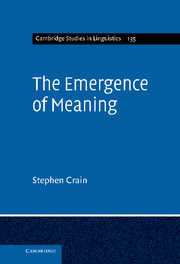Book contents
6 - Two logical operators for the price of one
Published online by Cambridge University Press: 05 November 2012
Summary
Child language acquisition proceeds without the benefit of the vast array of data available to linguists. In developing linguistic analyses, linguists consider many kinds of evidence that are not available to children, including cross- linguistic data, as well as both positive and negative evidence (i.e., the kinds of sentences that are ungrammatical in a particular language). These data permit linguists to disconfirm hypotheses, and formulate better ones. Despite the lack of cross-linguistic data and negative evidence in children’s experience, by the time they have reached their fourth birthday, every normal child has mastered many, perhaps most, of the linguistic and logical principles that have been uncovered by linguists and logicians over the past few decades of research.
The principles children master in the first few years of life include non-trivial generalizations. For example, we have seen that downward-entailing operators tie together clusters of apparently unrelated linguistic phenomena in particular languages, like English, and we have seen that the same phenomena are governed by downward- entailing operators in other languages around the globe. We have also seen that, although these phenomena appear unrelated at first glance, it turns out that, upon closer scrutiny, these phenomena are related at a deeper level of analysis. In the absence of an alternative account of these regularities – i.e., lacking a learning-theoretic account of how young children come to know these phenomena – it seems reasonable to conclude that humans are innately endowed with the universal principles and parameters of grammar, and that children only acquire languages that conform to these principles and parameters. Furthermore, many of these principles and parameters involve logical expressions and their interactions. So it is reasonable to suppose that logical principles and parameters (e.g., scope parameters) are part of the innate genetic endowment of the species.
- Type
- Chapter
- Information
- The Emergence of Meaning , pp. 224 - 265Publisher: Cambridge University PressPrint publication year: 2012



